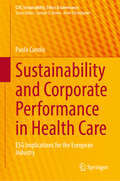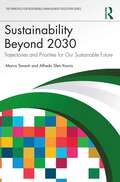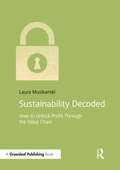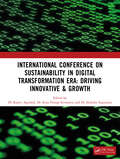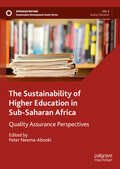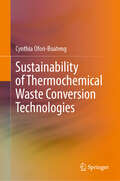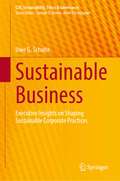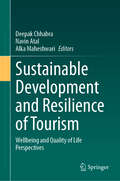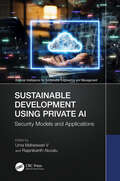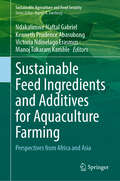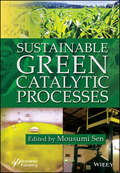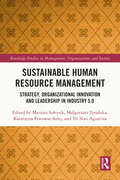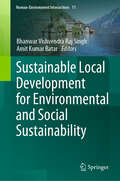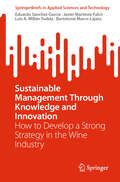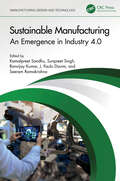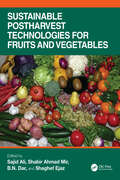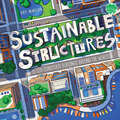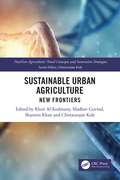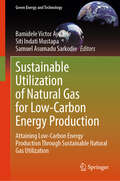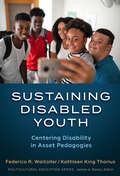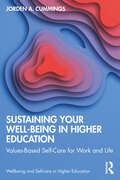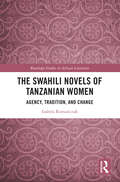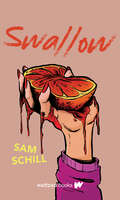- Table View
- List View
Sustainability and Corporate Performance in Health Care: ESG Implications for the European Industry (CSR, Sustainability, Ethics & Governance)
by Paolo CandioThis book explores the multifaceted relationship between sustainability and corporate performance in health care by providing a review of the relevant policy and academic literature, together with novel quantitative evidence to support strategic and managerial decision-making. The book uniquely investigates whether and how improvements in sustainability-related activities and reporting, and respective ESG scores assigned by international rating agencies, are related to corporations’ economic and market performance. The potential development and expansion in private health care services and products, accelerated by the COVID-19 pandemic, calls for a new paradigm in the health care industry. After introducing the reader to the social and policy context for sustainable development and to various normative and market instruments used to assess sustainability and corporate performance, the book presents the results of statistical analyses conducted on a representative sample of top health care companies listed in European capital markets and draws conclusions about the profitability and effectiveness of sustainability- and ESG-related investments. There’s a current debate about whether investing in sustainability not only fulfills ethical obligations but also drives long-term value. The empirical literature often presents conflicting findings, particularly when it comes to scholars’ relatively limited evaluation of the health care industry. The book sheds new light on this proposition and offers guidance on sustainable decision-making in health care, making it relevant for researchers and professionals.
Sustainability Beyond 2030: Trajectories and Priorities for Our Sustainable Future (The Principles for Responsible Management Education Series)
by Marco Tavanti Alfredo Sfeir-YounisSustainability Beyond 2030: Trajectories and Priorities for Our Sustainable Future is an indispensable guide to understanding our planet's sustainability past, present, and future. It is a tool for enlightenment, engagement, and empowerment towards shaping a sustainable world as we approach the milestone year of 2030.Written by renowned sustainability experts, Marco Tavanti and Alfredo Sfeir-Younis, who was a pioneer in the field and participated in the first 1972 United Nations Conference on the Human Environment, this book offers an in-depth analysis of critical environmental issues, human development challenges, and the economic complexities of fostering equitable and sustainable growth. In addition to evaluating various pivotal policies and events, by extracting patterns and trajectories that have shaped our present commitments to the 2030 SDGs and the 2050 climate goals, Sustainability Beyond 2030 boldly projects into the future, identifying core priorities likely to guide the global agenda beyond our current commitments. This foresight is coupled with well-informed recommendations, essential for building resilience and fostering future opportunities.This book is a call to action for current and future generations of sustainability leaders. It encourages readers, whether policymakers, academics, or engaged citizens, to participate in the collective responsibility of crafting a sustainable world for future generations.
Sustainability Decoded: How to Unlock Profit Through the Value Chain (DoShorts)
by Laura MusikanskiThe value chain is the tried and true foundation of any profitable business.Sustainability Decoded is a no-nonsense business book that shows you how to increase profits by integrating sustainability into your company's value chain. This practical guide provides innovative tools and approaches for adding value at each station, including: Sustainability Matrix Decision Tool for Codes of Conduct; Triple Bottom Line Short Form; Eco-Label Graphic Matrix; Sustainability Ratio Guide; Life Cycle Analysis Grid; Local-Global Scorecard; the Redesign Card; the Green IT Checklist; the Balanced Scorecard for Life; the Biomimcry Backwards Forwards Tool.Sustainability Decoded provides a profitable means to practice sustainability. It is as useful to the non-business person who needs a quick guide to the practicalities and principles of adding value right across business processes as it is to the seasoned business professional looking for practical and profitable inspiration from sustainability. Includes case studies on Patagonia, and One PacificCoast Bank.
Sustainability in Digital Transformation Era: International Conference on Sustainability in Digital Transformation Era: Driving Innovative & Growth
by Rajeev Agrawal Arun Pratap Srivastava Akihiko SugiyamaIn the past few weeks, OpenAI has released ChatGPT (Chat Generative Pre-trained Transformer). ChatGPT emerges as a formidable chatbot, surpassing various iterations of the GPT model, and plays a transformative role in user interactions with AI systems. In the dynamic realm of AI technologies, influential applications like ChatGPT, developed by OpenAI, mir□ror the transformative consideration of the simplicity on multiple facets of our daily lives. This potent technology holds the potential for significant positive changes, particularly in healthcare where the introduction of GPT and chatbot models opens promising avenues for disease treatment and technological innovation.
The Sustainability of Higher Education in Sub-Saharan Africa: Quality Assurance Perspectives (Sustainable Development Goals Series)
by Peter Neema-AbookiThis book delves into the role of higher education as a means of sustainable development in Sub-Saharan Africa. Contributions from across the region examine the strategies and technological advances available to enable students to deal with an uncertain future and are organised under two key themes: Curriculum and Teaching and Higher Education and Innovations. The volume brings together theoretical and practical perspectives, relating them to international benchmarks while maintaining the specificities of the African context. It will be of interest to students and scholars as well as practitioners whose work interrogates higher education, quality assurance, and sustainable development goals.
Sustainability of Thermochemical Waste Conversion Technologies
by Cynthia Ofori-BoatengThis book elaborates on the sustainability of biofuels and biochemicals production via thermochemical conversion pathways. Sustainability encompasses the social, economic, environmental, political, and thermodynamic efficiencies of a production technology. Assessing the sustainability of wastes conversion pathways would help pinpoint inefficiencies hence improving the process economically, environmentally, and thermodynamically. This book discusses the major sustainable potential feedstocks/waste for thermochemical conversion into bioproducts such as biodiesel and bioelectricity. Though there exist many pathways for thermochemical waste conversion (such as combustion, gasification, and pyrolysis) which operate on laboratory, pilot and commercial scales, their sustainability indices are scarce as there exist few sustainability assessment tools to help pinpoint inefficiencies. This book assesses the sustainability of various types of thermochemical conversion pathways using technoeconomic analysis as well as exergetic life cycle assessment tools. Common sustainability issues and the way forward for sustainable thermochemical wastes conversion into bioproducts are detailed in this book. For overall sustainability, thermochemical waste conversion process development alternatives are also discussed in this book. Given its scope, this is a valuable resource for renewable energy policy makers, bioprocess researchers in academia and related industries, students studying in the fields of Green Chemistry, Chemical and Mechanical Engineering as well as the general publics who have great interest in biofuels for sustainable development. Almost all books on thermochemical biomass conversion address only the process and new technologies, but few tend to address the technical and thermodynamic issues pertaining to sustainability due to the use of fossil fuel in the manufacturing process. This book bridges this knowledge gap, and subsequently outlines specific exergetic improvement options for biofuel and biochemicals production which is scarce in literature. This book assesses the sustainability of bioprocess technologies in a more concise manner for students to understand and apply the knowledge in their future engineering careers.
Sustainable Action in Economy and Society: Orientation for Change
by Reiner Manstetten Malte Faber Marc Frick Marco Rudolf Mi-Yong BeckerClimate change, species extinction, energy and raw material shortages are global challenges that are directly linked to our economic activity. They affect our very existence and jeopardize our ability to lead a good life today and in the future, both as a society and as individuals. The range of questions for which we need answers seems limitless and finding the "right" path for global change increasingly utopian. How do we maintain an overview in the face of highly complex interrelationships and interactions? How can we distinguish the essential from the non-essential? What fundamental relationships in nature do we need to take into account? What kind of economy is appropriate? What is just? And under what conditions are people willing to change? This book offers orientation. It deals with concepts from the natural sciences, economics and philosophy - including time, thermodynamics, scarcity, responsibility and justice - which enable an understanding of the upcoming transformation to sustainability from different perspectives. Ideally, they serve as guidelines for effective decisions and show how change is possible despite immense challenges. The book is aimed at anyone who wants to contribute to the transformation towards sustainability - whether in politics, business, administration or civil society.
Sustainable Business: Executive Insights on Shaping Sustainable Corporate Practices (CSR, Sustainability, Ethics & Governance)
by Uwe G. SchulteThis book presents discussions with corporate practitioners on several topics around sustainability. Between May 2019 and November 2022, the author engaged in dialogues with Senior Executives representing major multinational corporations, overseeing their corporate sustainability endeavours. The thematic spectrum of these conversations encompassed diverse topics such as The United Nations Sustainable Development Goals, Water-stressed regions, Ocean Plastic, Chemical Recycling, Renewable Energy, Sustainable Tourism, and the Just Transition, among others, with each episode concentrating on a singular subject. In this book supporting illustrations and graphs together with background references enrich the insights the conversations convey. The reader will learn about the sustainability challenges companies are facing and how they approach them. The book gives examples of sustainable solutions and international collaborations around greenhouse gas reduction, circular economy, restorative tourism as well as reducing plastic pollution and other global sustainability challenges.
Sustainable Development and Resilience of Tourism: Wellbeing and Quality of Life Perspectives
by Deepak Chhabra Navin Atal Alka MaheshwariThis volume examines progress in sustainable and resilient development of niche forms of tourism from a health and wellbeing perspective. It also aims to offer deep and innovative insights on the supporting role of non-pharmaceutical interventions to enhance resilience and wellbeing of visited and visiting communities. A comparative and critical discourse of the role of hard medicine is also offered, from both a core and supplementary perspective, particularly, from eudaimonic and physiologically restorative standpoints. Furthermore, indigenous non-pharmaceutical interventions and spiritual healing mechanisms are discussed in the context of their potential to facilitate long term immunity and happiness. The book conceptually situates health as a fourth pillar of sustainability, and examines its role in stimulating long-lasting transformations rooted in positive psychology, inner transformation and sustainable consumption of organic productsand services. It designs an evolving transformational ‘Quality of Life’ paradigm that strengthens the foundations of health/wellbeing-based sustainable development initiatives and resilience of tourism systems. The work will be of interest to academic, professional, and various public and private stakeholders of tourism such as destination marketing organizations, policy makers, hospitality industries, tour operators, host communities, NGOs, and government agencies.
Sustainable Development Using Private AI: Security Models and Applications (Artificial Intelligence for Sustainable Engineering and Management)
by Rajanikanth Aluvalu Uma Maheswari VThis book covers the fundamental concepts of private AI and its applications. It also covers fusion of Private AI with cutting-edge technologies like cloud computing, federated learning and computer vision.Security Models and Applications for Sustainable Development Using Private AI reviews various encryption algorithms used for providing security in private AI. It discusses the role of training machine learning and Deep learning technologies in private AI. The book provides case studies of using private AI in various application areas such as purchasing, education, entertainment, medical diagnosis, predictive care, conversational personal assistants, wellness apps, early disease detection, and recommendation systems. The authors provide additional knowledge to handling the customer’s data securely and efficiently. It also provides multi-model dataset storage approaches along with the traditional approaches like anonymization of data and differential privacy mechanisms.The target audience includes undergraduate and postgraduate students in Computer Science, Information technology, Electronics and Communication Engineering and related disciplines. This book is also a one stop reference point for professionals, security researchers, scholars, various government agencies and security practitioners, and experts working in the cybersecurity Industry specifically in the R & D division.
Sustainable Feed Ingredients and Additives for Aquaculture Farming: Perspectives from Africa and Asia (Sustainability Sciences in Asia and Africa)
by Ndakalimwe Naftal Gabriel Kenneth Prudence Abasubong Victoria Ndinelago Erasmus Manoj Tukaram KambleThis book describes sustainable aquaculture ingredients and additives uncovered in Africa and Asia. It also discusses current aquaculture research practices on alternative protein, carbohydrate, lipid, mineral, vitamin, and feed additives. It further demonstrates how aquaculture practices could be a feasible and cost-effective venture, capable of producing products in an environmentally sustainable manner. The aquaculture industry is suffering from scarcity of sustainable feedstuffs, particularly protein and oil components, which play an important role in the nutritional requirements of many aquaculture species. The availability of components such as fish meal, fish oil, and other synthetic feed additives has rendered aquaculture operations unsustainable, particularly in terms of cost. Therefore, the quest to replace such unsustainable components is developing in Africa and Asia. This book helps aquaculture farmers, researchers, the aquafeed industry, investors, students, lawmakers, and other stakeholders in the aquaculture field to comprehend scientific-based sustainable feed ingredients and additives in aquaculture from an African and Asian viewpoint.
Sustainable Green Catalytic Processes
by Mousumi SenThis groundbreaking book offers an in-depth description of sustainable green catalytic processes that have emerged as the means to empower the existing protocols with greener, sustainable, and environmentally benign versions that hold enormous potential in industry and society. Growing worldwide concerns about environmental pollution and global warming have directed the attention of scientists towards approaches for developing sustainable protocols, and the need for employing greener and more sustainable catalytic approaches that are environmentally greener and more eco-friendly than current ones. Green and sustainable catalysts are the one class of catalysts that possess higher selectivity and activity, efficient recovery from the reaction medium, recyclability, cost-effectiveness and are prepared using environmentally benign preparation techniques. The most potent instrument in organic synthesis, and the cornerstone of green chemistry, is catalysis which has broadened the possibilities for organic transformations in the direction of a sustainable future. The catalyst has been playing a vital role, from the improvement of reaction conditions to enhanced selectivity towards the intended product and a decrease in the creation of byproducts. The purpose of this book is to highlight the developments made towards designing new catalysts (homogeneous, heterogeneous, organocatalyst, nanocatalyst, photocatalyst, nanophotocatalyst, biocatalyst, nanobiocatalyst, metal catalyst etc,.) and present the advancements in the field of chemical synthesis using greener catalytic routes with far-reaching applications. The other environmentally friendly method is the enzymatic synthesis of organic molecules, which substitutes safe reagents for those that imitate the biosynthetic route to synthesize the desired organic molecules. With its ability to produce transformations that occasionally enable the reduction of steps in a synthetic route, biophotocatalysis has long been recognized as a green technology and key to creating environmentally friendly and sustainable chemistry. The employment of sustainable green processes on the most crucial reaction steps of the synthetic protocol satisfies contemporary needs for environmentally friendly operations during the creation of valuable chemicals. Readers will find the book: details new catalysts development designs (homo and heterogeneous); presents the advancement of organic synthesis using greener catalytic routes with far-reaching applications; elaborates on preparation techniques for green and sustainable catalysts that possess higher activity, efficient recovery, and cost-effectiveness; discusses how to epitomize a green approach towards the preparation of organic moieties via enzymatic synthesis; analyzes nano-catalysis with green-based reagents and solvents that allow producers to follow the fundamental pillars of the green economy; elucidates green chemistry’s principles and metrics of the chemical’s life cycle and design through disposal. Audience The core audiences for this book include scientists and engineers working in green chemistry, materials science, photocatalysts, biotechnology, nanotechnology, waste minimization, and sustainability. This book is an excellent resource for graduate students, R&D experts, and researchers in academic and industrial fields of chemical synthesis.
Sustainable Human Resource Management: Strategy, Organizational Innovation and Leadership in Industry 5.0 (Routledge Studies in Management, Organizations and Society)
by Mariusz Sołtysik Katarzyna Piwowar-Sulej Małgorzata Tyrańska Tri Siwi AgustinaGlobal trends favor balanced development, integrating socio-economic and environmental aspects. Sustainable development, emphasized by international organizations and the UN's Sustainable Development Goals, has evolved into Industry 5.0. Unlike Industry 4.0, Industry 5.0 prioritizes social justice and sustainable development, focusing on human-centricity, ecological balance, and resilience. It advocates for circular processes, reduced waste, and lowered environmental impact. The transition to a green economy requires bottom-up efforts from eco-entrepreneurs. In the era of knowledge-based economies, enterprises emphasize sustainable development, including the transition to Sustainable Human Resource Management (SHRM). SHRM combines sustainability with a soft approach to human resources, fostering trust, teamwork, and employee commitment. However, literature on SHRM lacks a universally accepted definition. This monograph aims to bridge gaps through theoretical and empirical examinations of connections between sustainable HR practices and Industry 5.0, identifying competencies needed for effective implementation within this framework. The study contributes to the understanding of the evolving relationship between Industry 5.0 and sustainable HR practices, setting the stage for further research.
Sustainable Knitting for Beginners and Beyond: 20 Patterns for Environmentally Friendly Knits
by epipaThe perfect resource for any knitter wanting to reduce their carbon footprint and create wonderful, sustainable projects for their friends and family. This collection of twenty projects from knitting blogger and environmentalist Epipa shows you how to knit more sustainably. With this practical guide you can learn how to make your knitting more environmentally friendly by choosing the most eco-friendly yarns such as bamboo, organic cotton, linen and flax, as well as tips on how to reduce your yarn footprint. Drawing on her childhood experience where she was encouraged by her grandmothers to reuse, repair, and recycle, Epipa shares all her ideas for living a more sustainable lifestyle while still enjoying the craft of knitting. As well as advice on yarn sourcing and the environmental impact of various different types of yarn, Epipa shares her knitting patterns for a more zero waste lifestyle. There are instructions for how to turn old t-shirts, bed linen and tablecloths into your own cotton yarn and how to restore unravelled yarn from unfinished projects to its former glory rather than laying abandoned in a cupboard. The projects include beautiful, useful and practical things for everyday life such as shopping baskets for the larder, the kitchen and the bathroom as well as rugs and runners and accessories for the bathroom. Choose from knitted tea towels, dish clothes, and shopping bags so you don&’t need to buy &“disposable&” plastic versions. Many of the projects are suitable for beginner knitters, and all the basic knitting instructions are included, but there are also more complicated projects including a knitted top and backpack for those with more experience.
Sustainable Local Development for Environmental and Social Sustainability (Human-Environment Interactions #11)
by Bhanwar Vishvendra Raj Singh Amit Kumar BatarThe world organizations, including national governments, have already recognized the importance of the Aichi Biodiversity Target, the Paris Agreement, Sustainable Development Goals (SDGs), Ecosystem-based Disaster Risk Reduction (Eco-DRR), Low Carbon Society. Therefore, there is an urgent need to act locally to tackle socio-economic, socio-ecological, socio-hydrological, and environmental conservation concerns in changing environments on a local to global scale and need to promote scientific solutions and common knowledge to achieve harmony between nature and humans under the threat of global climate change and the post-Covid-19 pandemic situation. For this purpose, the SLD approach is needed towards environmental and social sustainability. However, the SLD approach is challenging in terms of supply and demand of natural resources, resource depletion, socio-economic inequality, biodiversity loss, and climate change risk from local to the global scale, which vary based on different socio-economic, political, geographical, and cultural factors. Therefore, this book will highlight the environmental and social sustainability research by taking the local/regional case study. This book would also highlights the importance of policy interface at a local to global scale for environmental and social sustainability (ESS) in changing environments.
Sustainable Management Through Knowledge and Innovation: How to Develop a Strong Strategy in the Wine Industry (SpringerBriefs in Applied Sciences and Technology)
by Javier Martínez-Falcó Bartolomé Marco-Lajara Eduardo Sánchez-García Luis A. Millán-TudelaThis book explores multiple types of innovation within the modern wine industry and how it has developed historically. The book provides and extensive examination of the existing knowledge in this subject. This highlights the evolution of historical and contemporary trends and signposts the authoritative literature published and most important researchers active in the field. With this comprehensive approach, the book is a versatile resource for both scholars and industry professionals, akin to a "Swiss Army Knife" for all aspects of green innovation in the wine sector.
Sustainable Manufacturing: An Emergence in Industry 4.0 (Manufacturing Design and Technology)
by J. Paulo Davim Seeram Ramakrishna Sunpreet Singh Kamalpreet Sandhu Ranvijay KumarSustainable manufacturing is a key component in the engineering industry, helping to decrease emissions, costs, and energy use. Through examining how to successfully implement sustainability within Industry 4.0, Sustainable Manufacturing: An Emergence in Industry 4.0 covers recent innovations in topics, including circular economy, supply chains, waste elimination, and recycling.This edited collection is a cutting-edge assessment of the barriers preventing the implementation of sustainable manufacturing in industry. Highlighting basic definitions and terminologies within sustainability and manufacturing, this book covers topics that include interactive design, remanufacturing, cleaner production, and optimization. It also features modern technologies currently revolutionizing the industry, such as robotics and 3D printing. Using case studies to illustrate success stories in which products have been created using sustainable processes, this book also includes technical notes and experimental results from a wide variety of international contributors.This book is relevant to anyone working in the mechanical engineering, manufacturing and industrial engineering, and materials science industries.
Sustainable Postharvest Technologies for Fruits and Vegetables
by Shabir Ahmad Mir B. N. Dar Sajid Ali Shaghef EjazFruits and vegetables, commonly termed as "fresh produce" are an important component of the human diet, as these provide various beneficial and essential health-related compounds. Nevertheless, fresh produce is susceptible to postharvest deterioration and decay along with loss of certain nutrients due to innapropriate storage conditions and lack of standard postharvest technologies. In addition, the short shelf life is considered another major constraint that must be extended after harvest to ensure a wider availability window of the fresh produce for consumers. From this perspective, the use of postharvest approaches is considered imperative to reduce the deterioration of harvested fresh produce in order to extend their storage and shelf life potential on a sustainable basis. Sustainable Postharvest Technologies for Fruits and Vegetables covers various aspects of postharvest technologies with major developments over the recent past and provides a way forward for the future.The sustainable use of various technologies and elicitors could be adapted from farm to fork in order to conserve the eating quality of fresh produce. Therefore, this book covers various sustainable postharvest treatments and technologies that could be considered highly effective for the delay of postharvest senescence and deterioration. Among the various technologies, the use of preharvest treatments, controlled atmosphere, dynamic control atmosphere, modified atmosphere and hypobaric conditions has tremendous potential for the fresh fruits and vegetables industry. In the same way, cold plasma, pulsed light, ultraviolet light, ultrasound technology, nanoemulsions, nano-packaging, electrolyzed water, high pressure processing, ozone gas, irradiations, edible coatings, vacuum packaging and active packaging with slow releasing compounds along with nanotechnology are highly practicable and possesses tremendous potential to be used in the maintenance of overall eating quality and storage life extension of the fresh produce.Key Features: Overviews the major factors affecting postharvest physiology and shelf life potential of fresh produce. Focuses on major sustainable technologies having the potential to maintain postharvest quality and extend shelf life of fruits and vegetables. Describes practical and recent advances of various approaches indispensable for the maintenance of overall eating quality and food safety attainment for fresh produce on a sustainable basis. Covers how quality maintenance and shelf life rely on preharvest practices, nonthermal treatments, storage atmospheres, packaging materials, active packaging, edible packaging, coating application techniques, nanotechnology and ecofriendly plant extracts and natural antagonists.
Sustainable Structures: 15 Eco-Conscious Buildings Around the World (Books for a Better Earth)
by Kate McMillanA stunning illustrated overview of &“green&” architecture on every continent, packed full of cool STEAM facts and fascinating details.From a waste collection site built entirely from recycled materials, to a school designed to float during flood season in Bangladesh, this dazzling book highlights innovative and sustainably built structures around the world. Did you know that &“woodscrapers,&” or skyscrapers made of wood, can reduce construction waste? How about that termite mounds have served as inspiration for temperature control systems? And believe it or not… there&’s a research station built on skis in Antarctica.Pairing a kid friendly, conversational approach with spectacularly detailed art, Kate McMillan dissects the design of 15 eco-friendly buildings worldwide. The extraordinary structures fall into five categories, each emphasizing a key element of sustainable design: 1) local materials, 2) adaptability, 3) sustainable construction, 4) clean energy, and 5) optimized space. Readers of all ages will love poring over the precise, colorful illustrations and informative close ups featured on eye catching double-page spreads. Perfect for budding architects and engineers, this book is a work of art!Books for a Better Earth™ are designed to inspire children to become active, knowledgeable participants in caring for the planet they live on.A Junior Library Guild Gold Standard Selection
Sustainable Urban Agriculture: New Frontiers (Nextgen Agriculture)
by Chittaranjan Kole Kheir Al-Kodmany Sharmin Khan Madhav GovindIn the vibrant discourse of urbanization and climate change, Sustainable Urban Agriculture: New Frontiers investigates emerging needs, rising challenges, and opportunities to support urban agriculture. Navigating the dynamic interplay of urbanization and environmental challenges, the book introduces two pivotal agendas for urban sustainability—the "green" agenda, focusing on environmental health, and the "brown" agenda, emphasizing human well-being and social justice. The book embraces a global perspective by confronting geographical biases and advocating for context-specific understanding and early interventions in small and medium cities. This transformative journey guides readers through uncharted territories, fostering profound awareness of urban agriculture's role in shaping a sustainable and resilient future in agriculture.Features Presents information on socio-ecological resilience, shaping a sustainable urban future Unveils practical implications, traversing frontiers where urban cultivation extends beyond crops, cultivating a thriving urban ecosystem Discusses diverse urban agriculture practices, from traditional methods to cutting-edge technologies Providing readers with an understanding of the multifaceted layers inherent in urban agriculture, this volume in the NextGen Agriculture: Novel Concepts and Innovative Strategies series is essential for academics, students, practitioners, and experts in urban agriculture and planning, horticulture, landscape architecture, and plant sciences.
Sustainable Utilization of Natural Gas for Low-Carbon Energy Production: Attaining Low-Carbon Energy Production Through Sustainable Natural Gas Utilization (Green Energy and Technology)
by Bamidele Victor Ayodele Siti Indati Mustapa Samuel Asumadu SarkodieThis book presents a detailed analysis of sustainable utilization of natural gas for low-carbon energy production. Its content is divided into three parts with the intention to address natural gas supply chain, technological advances in natural gas utilization, and role of natural gas in transition to a low-carbon economy. In particular, it describes the various technological pathways for the conversion of natural gas to valuable products such as hydrogen, syngas and other alternative fuel, which can be used as chemical intermediates or for co-generation of electricity and heat. This book is targeted at wide audience in the academia and industries who want a comprehensive knowledge of how natural gas can be sustainable utilized for low-carbon energy production.
Sustaining Disabled Youth: Centering Disability in Asset Pedagogies (Multicultural Education Series)
by Frederico R. Waitoller Kathleen A. King ThoriusAsset-based pedagogies, such as culturally relevant/sustaining teaching, are frequently used to improve the educational experiences of students of color and to challenge the White curriculum that has historically informed school practices. Yet asset-based pedagogies have evaded important aspects of students’ culture and identity: those related to disability. <P><P> Sustaining Disabled Youth is the first book to accomplish this. It brings together a collection of work that situates disability as a key aspect of children and youth’s cultural identity construction. It explores how disability intersects with other markers of difference to create unique cultural repertoires to be valued, sustained, and utilized for learning. <P><P>Readers will hear from prominent and emerging scholars and activists in disability studies who engage with the following questions: Can disability be considered an identity and culture in the same ways that race and ethnicity are? How can disability be incorporated to develop and sustain asset-based pedagogies that attend to intersecting forms of marginalization? How can disability serve in inquiries on the use of asset-based pedagogies? Do all disability identities and embodiments merit sustaining? How can disability justice be incorporated into other efforts toward social justice?
Sustaining Your Well-Being in Higher Education: Values-Based Self-Care for Work and Life (Wellbeing and Self-care in Higher Education)
by Jorden CummingsThis book provides an evidence-based approach to sustainable self-care, anchoring these strategies in individual academic workers’ core personal values. It teaches readers how to use their values to leverage self-care strategies into a workable, individualized, and effective map to wellness.Working in the demanding environment of higher education can leave little time for self-care, yet making space for wellness and self-care is essential to creating a creative and innovative environment for academic work. This book shows how to create and successfully implement realistic self-care plans. By identifying core values and using these to develop individualized self-care plans, Sustaining Your Well-Being in Higher Education pushes back against a one-size-fits-all approach while also discussing the role of self-care in academic labor activism and providing strategies for readers to become advocates for better self-care practices within their zones of influence.Designed to provide academic workers with the skills they need to develop workable and sustainable self-care plans, this book is an invaluable resource for students and professionals working in all areas of higher education.
The Swahili Novels of Tanzanian Women: Agency, Tradition, and Change (Routledge Studies in African Literature)
by Izabela RomańczukThis book provides a rich and full analysis of female Swahili novelists from a feminist perspective, highlighting their important contributions to the living Swahili literary and intellectual tradition.Compared to the diverse and centuries-old oral literature, or religious-philosophical poetry tradition developing since at least the 17th century, the novel is a relatively young phenomenon in the rich body of Swahili literary output, emerging only in the last hundred years. Since then, academia has focused primarily on male novelists, largely disregarding important female writers such as Ndyanao Balisidya, Zainab Burhani, Martha Mvungi Mlangala, Zainab Mwanga, Lucy Nyasulu, and Zainab Alwi Baharoon. This book traces the evolution of women’s writing in Tanzania, highlighting emancipatory and feminist discourses, as well as intersectional themes of class, education, and urbanisation. The author demonstrates how concepts such as utu 'the essence of humanity', aibu 'shame', 'disgrace' and heshima 'honor', 'social respectability' are used in the novels to articulate the value systems and social norms in Swahili communities, including the gendered perceptions of women that they create.Grounded throughout in the historical and socio-political contexts of the authors it discusses, this book will be an important read for researchers of African literature and women’s studies.
Swallow
by Sam SchillRevenge is a dish best served cold.The students at Roanoke High School have created a soundtrack that runs constantly in Mildred Waco’s mind . . .Change your hair, Mildred.Change your face, Mildred.Change your body, Mildred.Everyone hates you, Mildred.Are you really going to wear that, Mildred?The stares, the snickers, the constant teasing—combined with Mildred’s own self-doubt and absentee parents—takes its toll. Stumbling upon the Crossroads Magicks shop, Mildred decides she will no longer simply endure the bullying and skeptically buys a revenge curse.But when she begins to lose control and Roanoke students are found brutally murdered, Mildred realizes that she may have bought more than she bargained for. With time running out, Mildred will have to stop the terrible forces she’s unleashed or lose her soul forever.
